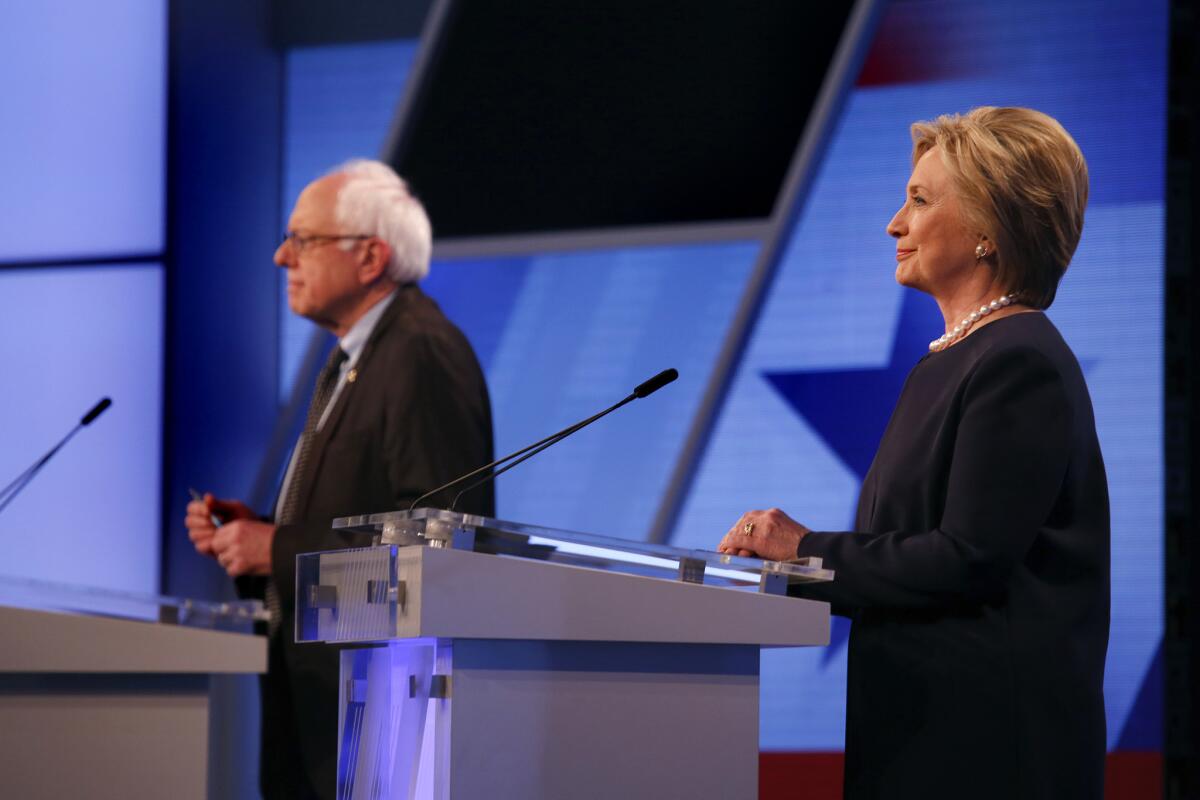5 debate moments that might not have happened without the Spanish-language media

The debate begins.
- Share via
From the beginning, it was clear Wednesday night's Democratic presidential debate was going to be a little bit different.
Broadcast simultaneously on CNN and Univision, the nation's largest Spanish-language network, the debate kicked off with moderator Maria Elena Salinas speaking a few words of rapid-fire Spanish. That set the tone for questioning that focused more on immigration and Latino issues than most debates this election cycle, as did a Republican debate last month hosted by Spanish-language network Telemundo.
The forums have highlighted the growing importance of the Latino vote, which is expected to be 40% larger this year than it was in 2008.
Here are a few moments at the debates hosted by Spanish-language media that might not have happened otherwise:
Immigrants asked questions
Immigration has been at the forefront of the campaign, ever since Donald Trump criticized people arriving illegally from Mexico in his announcement speech.
Since then, candidates have vigorously debated border walls, refugee policies and deportation techniques. But the voices of immigrants have largely been absent.
That changed Wednesday night, when an immigrant audience member asked Democratic candidates Hillary Clinton and Sen. Bernie Sanders a question in Spanish about her partner's deportation.
"I have a big pain, my sons and me, because the father of my children was deported for not having a license," the woman said in Spanish. "What will you do to stop the deportations and reunite families?"
In an instant, the debate over deportation was made a little less abstract and a little more human.
'Hispandering' went mainstream
At Wednesday night's debate, Salinas dropped a new phrase when talking about candidates who make promises to the Latino community to win votes: "Hispandering."
The issue first came up at last month's Republican debate on Telemundo, when moderator Maria Celeste Arrarás asked Florida Sen. Marco Rubio about his comments to a Spanish-language reporter that he would let President Obama's deportation deferral program run its course. Rubio has told English-language audiences that he would end the program immediately.
"Sen. Rubio, what changed?" she asked him. The candidate explained that he does plan to wind down the program if he is elected president.
We got to watch Bernie Sanders praising Fidel Castro's Cuba
Sanders, the Vermont senator who's running for the Democratic presidential nomination, has been asked repeatedly about his self-described "democratic socialist" beliefs.
But it took a pointed question in front of a largely Cuban American audience Wednesday night to get him to assert a certain admiration of Fidel Castro's communist government.
Sanders was asked about a video interview from the 1980s in which he appeared to be praising aspects of Castro's governance. Sanders explained to the audience in Miami -- home to many Cuban exiles -- that those comments had to do with failed U.S. attempts to intervene in Cuban politics.
But he also refused to apologize for praising Castro, adding that Cuba has made "good advances" in healthcare and education.
Sanders and Clinton pledged to end deportations of children
This was a big moment in Wednesday night's debate. Sanders and Clinton pledged to break with President Obama's policy of deporting young immigrants in the country illegally.
And it wouldn't have happened if Univision anchor Jorge Ramos hadn't questioned the candidates about the issue repeatedly. When Clinton tried to avoid a direct response on what she would do with immigrant children, many of whom are fleeing violence in Central America, Ramos pressed her to answer.
She and Sanders both eventually pledged not to deport any children who are already in the country illegally, although they didn't say what should happen to future young arrivals.
Español was spoken
Spanish is the primary language spoken at home by nearly 40 million Americans. Many of those people never get to hear directly from the political candidates seeking their votes, instead relying on dubbed translations on television.
English-speaking CNN viewers got a taste of that experience Wednesday when parts of the broadcast were translated in real time from Spanish into English. The audio, which at times were confusing and timed slightly off, highlighted how much can get lost in translation.
The Telemundo debate also provided a rare instances of Texas Sen. Ted Cruz speaking Spanish on the campaign trail. While Rubio often speaks in Spanish and leans heavily on his story as the son of immigrants, Cruz rarely acknowledges his own Cuban immigrant story and ethnic heritage.
That changed when Rubio criticized him in the Telemundo debate for not being able to understand what was said on Spanish-language news programs. Cruz lashed back -- in Spanish. His accent wasn't perfect, but it wasn't about that.
For more stories on the presidential campaign, follow me on Twitter: @katelinthicum
Sign up for Essential California
The most important California stories and recommendations in your inbox every morning.
You may occasionally receive promotional content from the Los Angeles Times.








